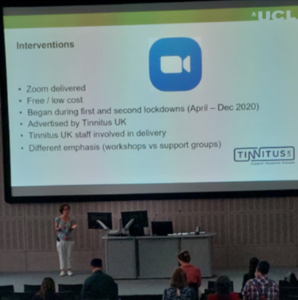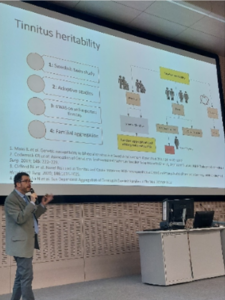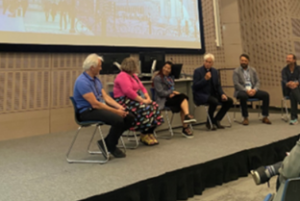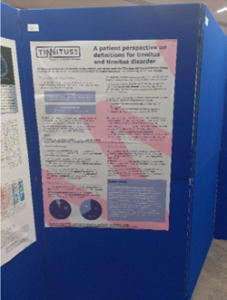TRI Conference 2023
Our Communications Manager Nic Wray was invited to talk about Tinnitus UK’s work and to participate in one of the keynote sessions.
The Tinnitus Research Initiative (TRI) Conference is probably the largest in-person gathering of tinnitus researchers worldwide. Back for the first time since 2019, our Communications Manager Nic Wray was invited by the organisers to attend to talk about Tinnitus UK’s work and to participate in one of the keynote sessions.
Held in the beautiful surroundings of Trinity College Dublin, there was a packed programme of presentations, including many parallel sessions. This meant it was impossible to catch every talk, but Nic focused on attending the ones discussing tinnitus management and potential treatments.
The sessions at the Conference were split into 12 themes, which really indicates how broad the field is, and the many active areas of research. The themes included neuromodulation, cognitive behavioural therapy, neuroimaging, digital health, sound stimulation, somatic tinnitus and public and patient involvement.
As part of the digital health session, Nic gave a presentation on the development of Axel, our tinnitus chatbot. This sparked many questions and conversations with attendees, and there could well be chatbots based on our model springing up in Italy, Belgium and elsewhere in the coming months!

Our Trustee, Lucy Handscomb (pictured), presented her findings on the effectiveness of Tinnitus UK’s online workshops and tinnitus support groups during the Covid-19 pandemic, and again, this was very well received.
There was also a series of fascinating keynote presentations and discussions, which included a review of tinnitus models from Professor Jos Eggermont; Professor Gerhard Anderson on internet-delivered CBT for tinnitus, Dr Arnaud Norena on the involvement of the middle ear in tinnitus and Professor Antonio Lopez Escamez on the genetic landscape of tinnitus (pictured).


The overarching theme of the Conference this year was “Engineering the Future of Tinnitus: Bridging Academia, Industry, Medicine and Society” and Nic was also invited onto a keynote discussion panel to represent those living with tinnitus. It was a very engaging session, and Nic was able to emphasise the impact of tinnitus and cost to healthcare systems and society of the condition. It was clear that all sectors want to head in the same direction, and are keen to collaborate more, but that the infrastructure – and funding – needs to be there.
A highlight of the Conference was the poster exhibition, which had over 80 posters discussing people’s latest research. Tinnitus UK submitted one poster ‘A patient perspective on definitions for tinnitus and tinnitus disorder’ which again stressed the need for researchers to consider the needs and opinions of people living with tinnitus.

We will be asking several of the presenters and researchers to tell us more about their research by writing summaries for our website, so do look out for them over the coming months.
Friday afternoon was given over to TRI’s first ever public engagement event, which was focused on building communities of interest. There were people there from CHIME, the national charity who run the deafness and tinnitus service in Ireland, and Nic talked about the support offered from Tinnitus UK. Tinnitus Talk were there to give an international perspective, and organisations working with people with other long-term conditions also contributed. It was very heartening to see that people living with tinnitus are beginning to be given more of a platform.
After several difficult years for the tinnitus research community, it was encouraging to see so many people together, discussing their work and building those relationships which will see the field move forward. We hope that momentum can be regained, and that next year’s Conference in Vancouver will have even more to talk about!
